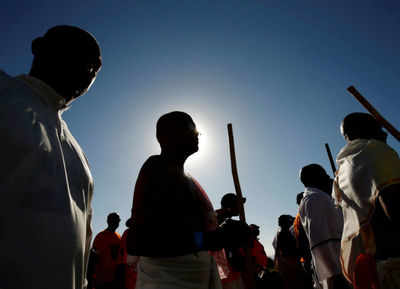- News
- NRI News
- Other News
- 'South Africans should take deep look to continue Gandhi's legacy'
This story is from April 24, 2017
'South Africans should take deep look to continue Gandhi's legacy'
South Africans should take a deep look within themselves to continue the legacy of Mahatma Gandhi and counter claims that call him a "racist" and "sell- out", Indian-origin executive of an NGO said. Nishan Balton was referring to comments about Gandhi being racist during his tenure in the country.

Men dressed as Mahatma Gandhi participate in the annual Salt March in Durban (Reuters photo)
JOHANNESBURG: South Africans should take a deep look within themselves to continue the legacy of Mahatma Gandhi and counter claims that call him a "racist" and "sell- out", a top Indian-origin executive of an NGO said.
"We have to think very carefully about this - what does Gandhi represent; who best represents him, and how do we defend him from attacks that come against him from different places calling him a sell-out and racist," said Nishan Balton, the executive director of the Ahmed Kathrada Foundation.
He was speaking at the annual Gandhi Walk in the Indian suburb of Lenasia here.
Balton was referring to comments in South Africa that resurface regularly about Gandhi being racist during his tenure in the country.
The annual walk, which is accompanied by a fair, attracted more than 3,000 people who participated in fun runs in three distance categories.
Families, many pushing babies in prams, senior citizens and children participated in the walk organised by an arm of the Hindu Seva Samaj, comprising the Gujarati community of the Gauteng province of South Africa.
The Gandhi Walk was initiated more than three decades ago to raise funds for the completion of the Gandhi Hall in Lenasia, where the Indian-origin community of Johannesburg was forcibly resettled in the apartheid era in the 1950s.
The hall has long since been completed and serves as a focal point for the community for various events.
"We have to think very carefully about this - what does Gandhi represent; who best represents him, and how do we defend him from attacks that come against him from different places calling him a sell-out and racist," said Nishan Balton, the executive director of the Ahmed Kathrada Foundation.
He was speaking at the annual Gandhi Walk in the Indian suburb of Lenasia here.
Balton was referring to comments in South Africa that resurface regularly about Gandhi being racist during his tenure in the country.
"Nobody has countered those things effectively and it is something that we want to discuss with the Indian Consul General here, because if we don't respond to that, the loud, false interpretations of Gandhiji take hold," Balton added.
The annual walk, which is accompanied by a fair, attracted more than 3,000 people who participated in fun runs in three distance categories.
Families, many pushing babies in prams, senior citizens and children participated in the walk organised by an arm of the Hindu Seva Samaj, comprising the Gujarati community of the Gauteng province of South Africa.
The Gandhi Walk was initiated more than three decades ago to raise funds for the completion of the Gandhi Hall in Lenasia, where the Indian-origin community of Johannesburg was forcibly resettled in the apartheid era in the 1950s.
The hall has long since been completed and serves as a focal point for the community for various events.
End of Article
FOLLOW US ON SOCIAL MEDIA
